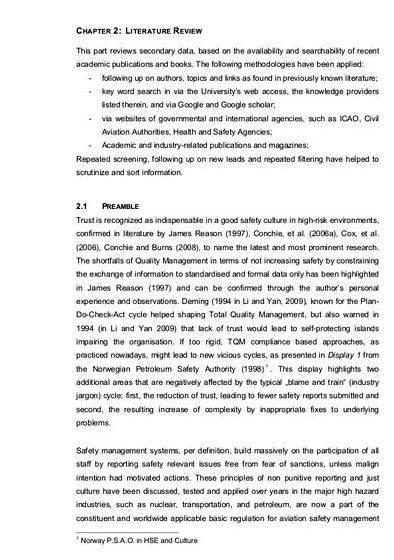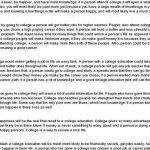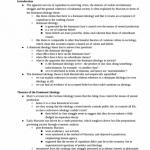Your guide to writing a Pyschology thesis
To be perfectly up front, there is no quick and easy way to write a thesis paper—after all, the average senior thesis is between 30-50 pages. Because this will represent the culmination of a (hopefully) productive undergraduate career, your final paper needs to demonstrate thorough research and extensive planning at a level of scholarship that will reassure your professors that they will not be committing a grave error in letting you loose into the world with a Bachelor’s Degree in psychology. Unlike an essay, where you gather facts in support of a particular argument, you must pick a topic, thoroughly investigate a large body of work related to it and then provide a novel interpretation of the material.
Choosing a topic for your psychology thesis
The first step toward writing a thesis is careful topic selection. As this will represent the culmination of your career as an undergraduate, be sure to choose a research topic where you are able to easily synthesize the available knowledge to show off your understanding of the subject matter. At first, you want the topic to be broad, so you look up articles and books related to ‘depression’ or ‘social dynamics’. After devouring much of the literature on depression, you may want to narrow your focus. In noticing that depression tends to be significantly higher among stigmatized groups in the population (i.e. ethnic minorities, gays/lesbians, the poor, or the physically unattractive), you then start researching how depression manifests within these particular communities, and start devising potential topics. These may include: the impact of social rejection on the obese, or how depression affects the academic results of gay teens, etc.
Gathering sources for your psychology thesis
No matter what you are asked to write, gathering reliable sources will enrich the content of your paper. The best places to look are academic databases such as JSTOR and Sage Publications for peer-reviewed journal articles and the library for books. Most professors would prefer that you restrict your source-findings to these media. However, if there are news articles, movies or unpublished dissertations relevant to your research, then by all means include them as well. Usually, teachers would want you to refrain from using open-source media such as Wikipedia or answers.com because they have not been edited by the appropriate authorities and arguments from there are not considered definitive proof in most academic circles. After choosing a research topic, you want to gather and review the relevant source material. It is only after this step that it is possible to flesh out a thesis statement.
Developing a working thesis and writing the rough draft
Once you get to this phase of the writing process, you have to make sure that the scope of your paper is neither too broad nor too narrow. However, with many research topics, you might find a deluge of information while with others, you will find only a few articles or books. To maximize the potential of your paper, you need to ensure that there is enough information available on your topic and that it is not so general that there is no indication that it will tell us anything different from the vast amount of research out there that has covered it in depth.
In any case, the thesis is the pinnacle of your paper and everything that you write before or after this point must support your argument. Be careful not to write anything that will contradict your thesis as that leads to confusion. In addition, it is not a good idea to deviate from the subject matter, as it will dilute the strength of your argument. In choosing your thesis, ensure that experts in the field have not yet reached a consensus about it (i.e. depression is a leading cause of suicide), and that there is supporting evidence no matter which side that you wish to argue. After you have pinned down your working thesis, it would be prudent to create an outline and write a rough draft. The rough draft would essentially serve as a compilation of your ideas. Just write down everything that could be relevant to your paper, as it is much easier to trim the fat than it is to add new content.
Revisions and producing the final draft
In order to produce a polished thesis paper, you must rewrite the paper several times until you have a neat product. The process will include not only correcting spelling, grammar, and punctuation errors, but also pruning unnecessary statements, sources that are not relevant to your argument, and ensuring that you have followed the format put forth by your professor. If possible, have a friend, colleague or professor proofread the document because, quite often, you are too invested in your own work to cut the dead weight and brilliantly diverting but useless arguments. Sometimes, you can get a brilliant paper within three drafts. Unfortunately, the process usually takes longer than that and can often take several more drafts before completion.
Referencing
Your professor will specify the referencing format of your final paper. While most psychology professors would request the author-date referencing format of the APA style, some prefer footnotes and bibliography such as Turabian and Chicago, while others prefer MLA. No matter which style is specified, you can find the information in the reference section of the library. Alternatively, you may prefer to purchase your own guide from bookstore or through Amazon.com.
RATE THIS RESOURCE:
Your guide to writing a Pyschology thesis
To be perfectly up front, there is no quick and easy way to write a thesis paper—after all, the average senior thesis is between 30-50 pages. Because this will represent the culmination of a (hopefully) productive undergraduate career, your final paper needs to demonstrate thorough research and extensive planning at a level of scholarship that will reassure your professors that they will not be committing a grave error in letting you loose into the world with a Bachelor’s Degree in psychology. Unlike an essay, where you gather facts in support of a particular argument, you must pick a topic, thoroughly investigate a large body of work related to it and then provide a novel interpretation of the material.
Choosing a topic for your psychology thesis
The first step toward writing a thesis is careful topic selection. As this will represent the culmination of your career as an undergraduate, be sure to choose a research topic where you are able to easily synthesize the available knowledge to show off your understanding of the subject matter. At first, you want the topic to be broad, so you look up articles and books related to ‘depression’ or ‘social dynamics’. After devouring much of the literature on depression, you may want to narrow your focus. In noticing that depression tends to be significantly higher among stigmatized groups in the population (i.e. ethnic minorities, gays/lesbians, the poor, or the physically unattractive), you then start researching how depression manifests within these particular communities, and start devising potential topics. These may include: the impact of social rejection on the obese, or how depression affects the academic results of gay teens, etc.
Gathering sources for your psychology thesis
No matter what you are asked to write, gathering reliable sources will enrich the content of your paper. The best places to look are academic databases such as JSTOR and Sage Publications for peer-reviewed journal articles and the library for books. Most professors would prefer that you restrict your source-findings to these media. However, if there are news articles, movies or unpublished dissertations relevant to your research, then by all means include them as well. Usually, teachers would want you to refrain from using open-source media such as Wikipedia or answers.com because they have not been edited by the appropriate authorities and arguments from there are not considered definitive proof in most academic circles. After choosing a research topic, you want to gather and review the relevant source material. It is only after this step that it is possible to flesh out a thesis statement.
Developing a working thesis and writing the rough draft
Once you get to this phase of the writing process, you have to make sure that the scope of your paper is neither too broad nor too narrow. However, with many research topics, you might find a deluge of information while with others, you will find only a few articles or books. To maximize the potential of your paper, you need to ensure that there is enough information available on your topic and that it is not so general that there is no indication that it will tell us anything different from the vast amount of research out there that has covered it in depth. In any case, the thesis is the pinnacle of your paper and everything that you write before or after this point must support your argument. Be careful not to write anything that will contradict your thesis as that leads to confusion. In addition, it is not a good idea to deviate from the subject matter, as it will dilute the strength of your argument. In choosing your thesis, ensure that experts in the field have not yet reached a consensus about it (i.e. depression is a leading cause of suicide), and that there is supporting evidence no matter which side that you wish to argue. After you have pinned down your working thesis, it would be prudent to create an outline and write a rough draft. The rough draft would essentially serve as a compilation of your ideas. Just write down everything that could be relevant to your paper, as it is much easier to trim the fat than it is to add new content.
Revisions and producing the final draft
In order to produce a polished thesis paper, you must rewrite the paper several times until you have a neat product. The process will include not only correcting spelling, grammar, and punctuation errors, but also pruning unnecessary statements, sources that are not relevant to your argument, and ensuring that you have followed the format put forth by your professor. If possible, have a friend, colleague or professor proofread the document because, quite often, you are too invested in your own work to cut the dead weight and brilliantly diverting but useless arguments. Sometimes, you can get a brilliant paper within three drafts. Unfortunately, the process usually takes longer than that and can often take several more drafts before completion.
Referencing
Your professor will specify the referencing format of your final paper. While most psychology professors would request the author-date referencing format of the APA style, some prefer footnotes and bibliography such as Turabian and Chicago, while others prefer MLA. No matter which style is specified, you can find the information in the reference section of the library. Alternatively, you may prefer to purchase your own guide from bookstore or through Amazon.com.
RATE THIS RESOURCE:
Your guide to writing a Pyschology thesis
To be perfectly up front, there is no quick and easy way to write a thesis paper—after all, the average senior thesis is between 30-50 pages. Because this will represent the culmination of a (hopefully) productive undergraduate career, your final paper needs to demonstrate thorough research and extensive planning at a level of scholarship that will reassure your professors that they will not be committing a grave error in letting you loose into the world with a Bachelor’s Degree in psychology. Unlike an essay, where you gather facts in support of a particular argument, you must pick a topic, thoroughly investigate a large body of work related to it and then provide a novel interpretation of the material.
Choosing a topic for your psychology thesis
The first step toward writing a thesis is careful topic selection. As this will represent the culmination of your career as an undergraduate, be sure to choose a research topic where you are able to easily synthesize the available knowledge to show off your understanding of the subject matter. At first, you want the topic to be broad, so you look up articles and books related to ‘depression’ or ‘social dynamics’. After devouring much of the literature on depression, you may want to narrow your focus. In noticing that depression tends to be significantly higher among stigmatized groups in the population (i.e. ethnic minorities, gays/lesbians, the poor, or the physically unattractive), you then start researching how depression manifests within these particular communities, and start devising potential topics. These may include: the impact of social rejection on the obese, or how depression affects the academic results of gay teens, etc.
Gathering sources for your psychology thesis
No matter what you are asked to write, gathering reliable sources will enrich the content of your paper. The best places to look are academic databases such as JSTOR and Sage Publications for peer-reviewed journal articles and the library for books. Most professors would prefer that you restrict your source-findings to these media. However, if there are news articles, movies or unpublished dissertations relevant to your research, then by all means include them as well. Usually, teachers would want you to refrain from using open-source media such as Wikipedia or answers.com because they have not been edited by the appropriate authorities and arguments from there are not considered definitive proof in most academic circles. After choosing a research topic, you want to gather and review the relevant source material. It is only after this step that it is possible to flesh out a thesis statement.
Developing a working thesis and writing the rough draft
Once you get to this phase of the writing process, you have to make sure that the scope of your paper is neither too broad nor too narrow. However, with many research topics, you might find a deluge of information while with others, you will find only a few articles or books. To maximize the potential of your paper, you need to ensure that there is enough information available on your topic and that it is not so general that there is no indication that it will tell us anything different from the vast amount of research out there that has covered it in depth. In any case, the thesis is the pinnacle of your paper and everything that you write before or after this point must support your argument. Be careful not to write anything that will contradict your thesis as that leads to confusion. In addition, it is not a good idea to deviate from the subject matter, as it will dilute the strength of your argument. In choosing your thesis, ensure that experts in the field have not yet reached a consensus about it (i.e. depression is a leading cause of suicide), and that there is supporting evidence no matter which side that you wish to argue. After you have pinned down your working thesis, it would be prudent to create an outline and write a rough draft. The rough draft would essentially serve as a compilation of your ideas. Just write down everything that could be relevant to your paper, as it is much easier to trim the fat than it is to add new content.
Revisions and producing the final draft
In order to produce a polished thesis paper, you must rewrite the paper several times until you have a neat product. The process will include not only correcting spelling, grammar, and punctuation errors, but also pruning unnecessary statements, sources that are not relevant to your argument, and ensuring that you have followed the format put forth by your professor. If possible, have a friend, colleague or professor proofread the document because, quite often, you are too invested in your own work to cut the dead weight and brilliantly diverting but useless arguments. Sometimes, you can get a brilliant paper within three drafts. Unfortunately, the process usually takes longer than that and can often take several more drafts before completion.
Referencing
Your professor will specify the referencing format of your final paper. While most psychology professors would request the author-date referencing format of the APA style, some prefer footnotes and bibliography such as Turabian and Chicago, while others prefer MLA. No matter which style is specified, you can find the information in the reference section of the library. Alternatively, you may prefer to purchase your own guide from bookstore or through Amazon.com.
RATE THIS RESOURCE:





 Self plagiarism phd thesis writing
Self plagiarism phd thesis writing Bboy octopus vs thesis proposal
Bboy octopus vs thesis proposal Kahirapan sa pilipinas thesis writing
Kahirapan sa pilipinas thesis writing Piled raft foundation thesis writing
Piled raft foundation thesis writing The dominant ideology thesis writing
The dominant ideology thesis writing






